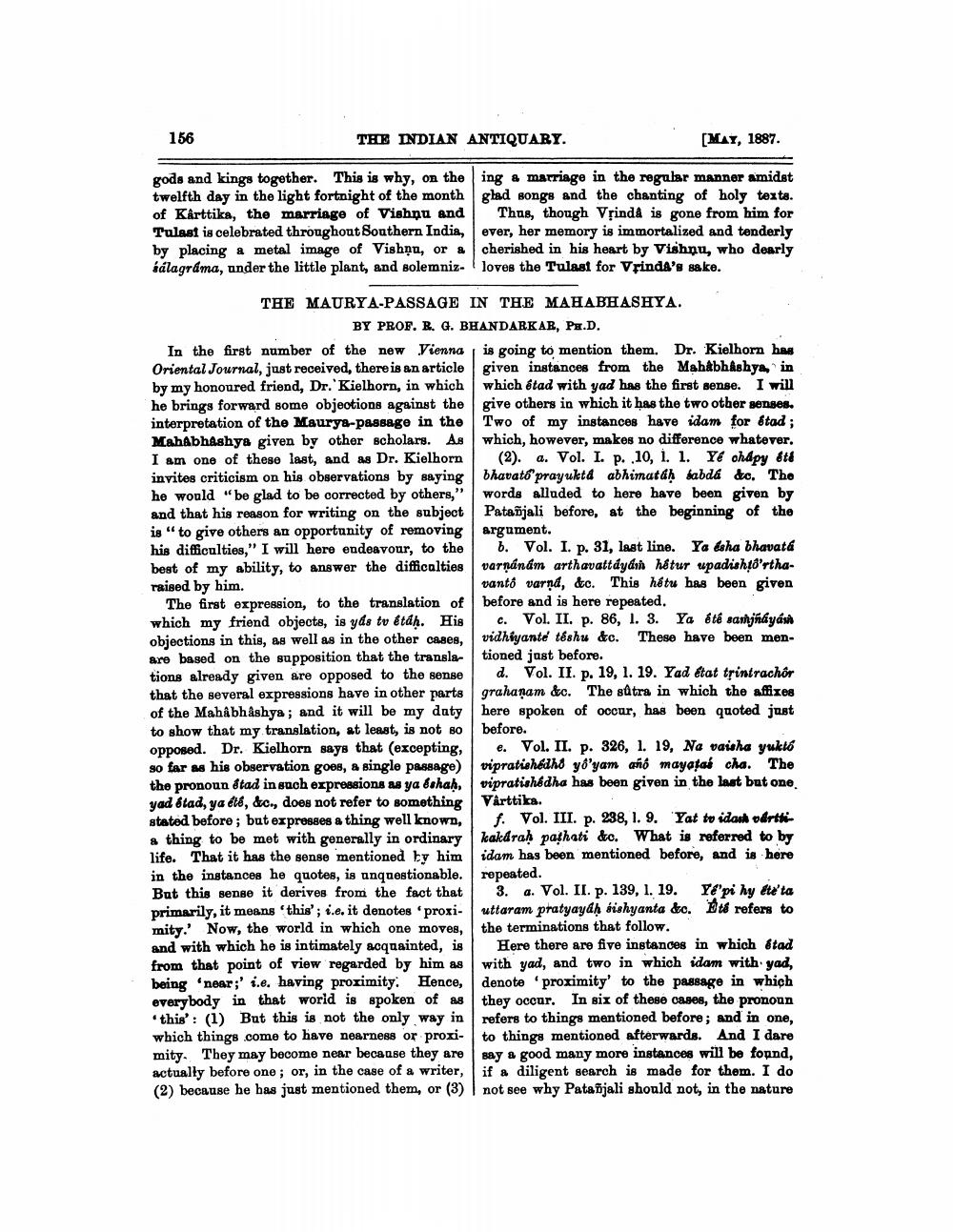________________
156
THE INDIAN ANTIQUARY.
[MAY, 1887.
gods and kings together. This is why, on the twelfth day in the light fortnight of the month of Kárttiks, the marriage of Vishnu and Tulast is celebrated throughout Southern India, by placing a metal image of Vishạn, or a hálagráma, under the little plant, and solemniz.
ing & marriage in the regular manner amidst glad songs and the chanting of holy texts.
Thus, though VrindA is gone from him for ever, her memory is immortalized and tenderly cherished in his heart by Vishnu, who dearly loves the Tulast for Vrinda's sake.
THE MAURYA-PASSAGE IN THE MAHABHASHYA.
BY PROF. B. G. BHANDARKAR, PH.D. In the first number of the new Vienna is going to mention them. Dr. Kielhorn has Oriental Journal, just received, there is an article given instances from the Mahabhashya, in by my honoured friend, Dr. Kielhorn, in which which étad with yad has the first sense. I will he brings forward some objections against the give others in which it has the two other senses. interpretation of the Maurya-passage in the Two of my instances have idam for Stad; MahAbhashya given by other scholars. As which, however, makes no difference whatever. I am one of these last, and as Dr. Kielhorn (2). a. Vol. I. p. 10, . l. Y chapy été invites criticism on his observations by saying bhavató prayukta abhimatáh fabdá do. The he would be glad to be corrected by others," words alluded to here have been given by and that his reason for writing on the subject Patañjali before, at the beginning of the is" to give others an opportunity of removing argument. his difficulties," I will here endeavour, to the b. Vol. I. p. 31, last line. Ya tsha bhavata best of my ability, to answer the difficulties varnánám arthavattdydın natur wpadisht8'rtharaised by him.
vanto varnd, &c. This hétu has been given The first expression, to the translation of before and is here repeated. which my friend objects, is yds tv étaḥ. His C. Vol. II. p. 86, I. 3. Ya 6té sanjhayása objections in this, as well as in the other cases, vidhiyanto teshu &c. These have been menare based on the supposition that the translationed just before. tions already given are opposed to the sense d. Vol. II. p. 19, 1. 19. Yad etat tsintrachôr that the several expressions have in other parts grahaņam &c. The sutra in which the affixes of the Mahâbhâshya; and it will be my daty here spoken of occur, has been quoted just to show that my translation, at least, is not so before. opposed. Dr. Kielhorn says that (excepting, e. Vol. II. p. 326, 1. 19, Na vaisha yuktó so far as his observation goes, a single passage) vipratishdhd yo'yam año mayata cha. The the pronoun stad in such expressions as ya &shah, vipratishédha has been given in the last but one. yad Stad, ya dts, &c., does not refer to something | Varttika. stated before; but expresses a thing well known, f. Vol. III. p. 238, 1. 9. Yat to idash odrtti & thing to be met with generally in ordinary kakdrah pashati do. What is referred to by life. That it has the senso mentioned by him idam has been mentioned before, and is here in the instances he quotes, is unquestionable. repeated. But this sense it derives from the fact that 3. a. Vol. II. p. 139, 1. 19. Yêpi hy eteta primarily, it means this'; i.e. it denotes proxi- uttaram pratyayan bishyanta &c. Eté refers to mity. Now, the world in which one moves, the terminations that follow. and with which he is intimately acquainted, is Here there are five instances in which étad from that point of view regarded by him as with yad, and two in which idam with yad, being 'near;' i.e. having proximity. Hence, denote proximity to the passage in which everybody in that world is spoken of as they occur. In six of these cases, the pronoun
this': (1) But this is not the only way in refers to things mentioned before, and in one, which things .come to have nearness or proxi- to things mentioned afterwards. And I dare mity. They may become near because they are say a good many more instances will be found, actually before one; or, in the case of a writer, if a diligent search is made for them. I do (2) because he has just mentioned them, or (3) not see why Patañjali should not, in the nature




